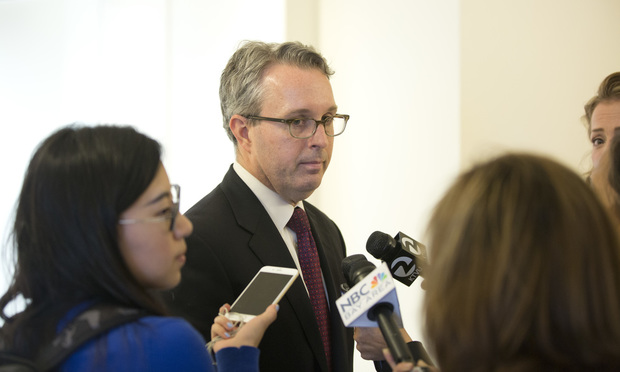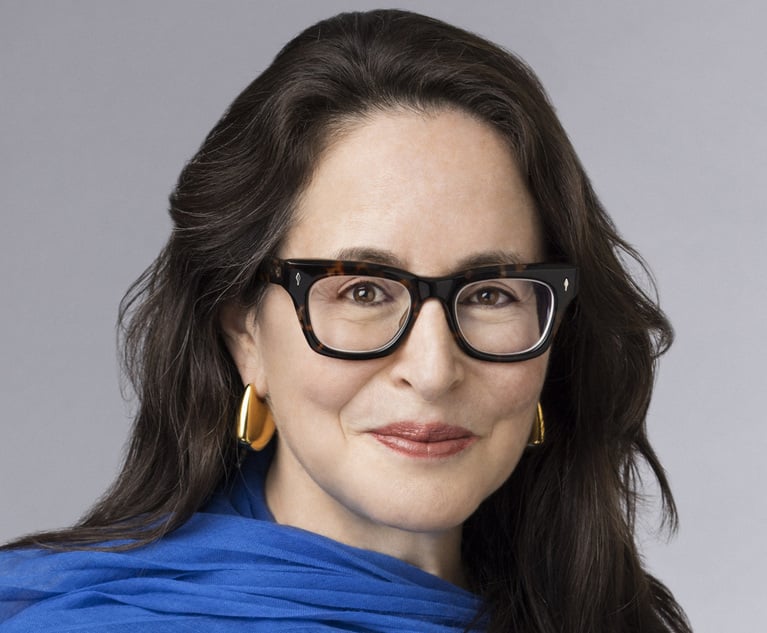Au Pairs Reach $65.5M Settlement Over Claims of Collusion to Reduce Wages
Counsel representing au pairs have reached a $65.5 million class action settlement with 15 companies over claims that the organizations mislead the foreign domestic workers about U.S. wage regulations in an effort to pay them below minimum wage.
January 09, 2019 at 06:49 PM
3 minute read
 Peter Skinner, Boies, Schiller & Flexner partner. Photo: Jason Doiy/The Recorder,
Peter Skinner, Boies, Schiller & Flexner partner. Photo: Jason Doiy/The Recorder,
Counsel representing au pairs have reached a $65.5 million class action settlement with 15 companies over claims that the organizations mislead the foreign domestic workers about U.S. wage regulations in an effort to pay them below minimum wage.
Boies Schiller Flexner, which represented the au pairs, and the not-for-profit Towards Justice, announced the settlement Wednesday. The case had been set for a trial in early February in the U.S. District Court for the District of Colorado, but the parties agreed to settle the case following mediation efforts by U.S. Magistrate Judge Michael Hegarty.
“We're pleased that our years of hard work will bring justice to so many young children workers and fundamentally change the way the au pair industry operates,” Boies Schiller attorney Peter Skinner said.
The settlement is subject to court approval.
According to a press release, the defendant companies, including Cultural Care, AuPairCare International and the American Institute for Foreign Study, were authorized by the U.S. State Department to sponsor individuals to participate in the au pair program and receive the needed visa to work in the states. However, plaintiffs alleged that the companies colluded to pay au pairs less than minimum wage and to mislead the workers about whether they were entitled to receive higher wages under state and federal law.
The release said the visas were intended to create a cultural exchange between countries through several initiatives, including au pairs, but, instead of promoting these goals, the au pair program allegedly worked as a source of below-minimum-wage childcare.
The release said that, along with the settlement, the sponsors agreed to reforms, including a requirement that all future au pairs be adequately paid and informed of their rights under U.S. laws.
The case raised fraud, antitrust and fair wage claims.
“This settlement, the hard-fought victory of our clients who fought for years on behalf of about 100,000 fellow au pairs, will be perhaps the largest settlement ever on behalf of minimum wage workers,” David Seligman, director of Towards Justice, said.
The case had been filed in 2014, and, according to Skinner, over the course of the litigation, plaintiffs counsel uncovered numerous statements indicating that the au pairs had been told they were only entitled to a below-minimum wage stipend that had been set by the U.S. government.
“A lot came to this country thinking this is a set stipend, and I don't have a right to ask for something different,” Skinner said. “There was also powerful evidence of collusion between the sponsors.”
However, in the end, he said, coupled with the amounts the plaintiffs could reasonably expect to receive from a successful trial, the risks that come with bringing a case before a jury and the reforms the defendants were willing to agree to, the parties felt settlement was the best option.
Joan A. Lukey, of Choate, Hall & Stewart in Boston, represented Cultural Care International; Gordon Rees Scully Mansukhani Denver-based attorney Thomas Quinn represented AuPairCare; and New York-based Stephen Macri of Ogletree, Deakins, Nash, Smoak & Stewart represented the American Institute for Foreign Study. Neither of the three could immediately return a call seeking comment late Wednesday.
This content has been archived. It is available through our partners, LexisNexis® and Bloomberg Law.
To view this content, please continue to their sites.
Not a Lexis Subscriber?
Subscribe Now
Not a Bloomberg Law Subscriber?
Subscribe Now
NOT FOR REPRINT
© 2025 ALM Global, LLC, All Rights Reserved. Request academic re-use from www.copyright.com. All other uses, submit a request to [email protected]. For more information visit Asset & Logo Licensing.
You Might Like
View All
Morgan Lewis Shutters Shenzhen Office Less Than Two Years After Launch


University of Chicago Accused of Evicting Student for Attending Gaza-Israel Protest
3 minute read
State Appellate Court Rejects Reasoning for Attorney's Removal From Conservatorship
5 minute readTrending Stories
- 1'A Death Sentence for TikTok'?: Litigators and Experts Weigh Impact of Potential Ban on Creators and Data Privacy
- 2Bribery Case Against Former Lt. Gov. Brian Benjamin Is Dropped
- 3‘Extremely Disturbing’: AI Firms Face Class Action by ‘Taskers’ Exposed to Traumatic Content
- 4State Appeals Court Revives BraunHagey Lawsuit Alleging $4.2M Unlawful Wire to China
- 5Invoking Trump, AG Bonta Reminds Lawyers of Duties to Noncitizens in Plea Dealing
Who Got The Work
J. Brugh Lower of Gibbons has entered an appearance for industrial equipment supplier Devco Corporation in a pending trademark infringement lawsuit. The suit, accusing the defendant of selling knock-off Graco products, was filed Dec. 18 in New Jersey District Court by Rivkin Radler on behalf of Graco Inc. and Graco Minnesota. The case, assigned to U.S. District Judge Zahid N. Quraishi, is 3:24-cv-11294, Graco Inc. et al v. Devco Corporation.
Who Got The Work
Rebecca Maller-Stein and Kent A. Yalowitz of Arnold & Porter Kaye Scholer have entered their appearances for Hanaco Venture Capital and its executives, Lior Prosor and David Frankel, in a pending securities lawsuit. The action, filed on Dec. 24 in New York Southern District Court by Zell, Aron & Co. on behalf of Goldeneye Advisors, accuses the defendants of negligently and fraudulently managing the plaintiff's $1 million investment. The case, assigned to U.S. District Judge Vernon S. Broderick, is 1:24-cv-09918, Goldeneye Advisors, LLC v. Hanaco Venture Capital, Ltd. et al.
Who Got The Work
Attorneys from A&O Shearman has stepped in as defense counsel for Toronto-Dominion Bank and other defendants in a pending securities class action. The suit, filed Dec. 11 in New York Southern District Court by Bleichmar Fonti & Auld, accuses the defendants of concealing the bank's 'pervasive' deficiencies in regards to its compliance with the Bank Secrecy Act and the quality of its anti-money laundering controls. The case, assigned to U.S. District Judge Arun Subramanian, is 1:24-cv-09445, Gonzalez v. The Toronto-Dominion Bank et al.
Who Got The Work
Crown Castle International, a Pennsylvania company providing shared communications infrastructure, has turned to Luke D. Wolf of Gordon Rees Scully Mansukhani to fend off a pending breach-of-contract lawsuit. The court action, filed Nov. 25 in Michigan Eastern District Court by Hooper Hathaway PC on behalf of The Town Residences LLC, accuses Crown Castle of failing to transfer approximately $30,000 in utility payments from T-Mobile in breach of a roof-top lease and assignment agreement. The case, assigned to U.S. District Judge Susan K. Declercq, is 2:24-cv-13131, The Town Residences LLC v. T-Mobile US, Inc. et al.
Who Got The Work
Wilfred P. Coronato and Daniel M. Schwartz of McCarter & English have stepped in as defense counsel to Electrolux Home Products Inc. in a pending product liability lawsuit. The court action, filed Nov. 26 in New York Eastern District Court by Poulos Lopiccolo PC and Nagel Rice LLP on behalf of David Stern, alleges that the defendant's refrigerators’ drawers and shelving repeatedly break and fall apart within months after purchase. The case, assigned to U.S. District Judge Joan M. Azrack, is 2:24-cv-08204, Stern v. Electrolux Home Products, Inc.
Featured Firms
Law Offices of Gary Martin Hays & Associates, P.C.
(470) 294-1674
Law Offices of Mark E. Salomone
(857) 444-6468
Smith & Hassler
(713) 739-1250








